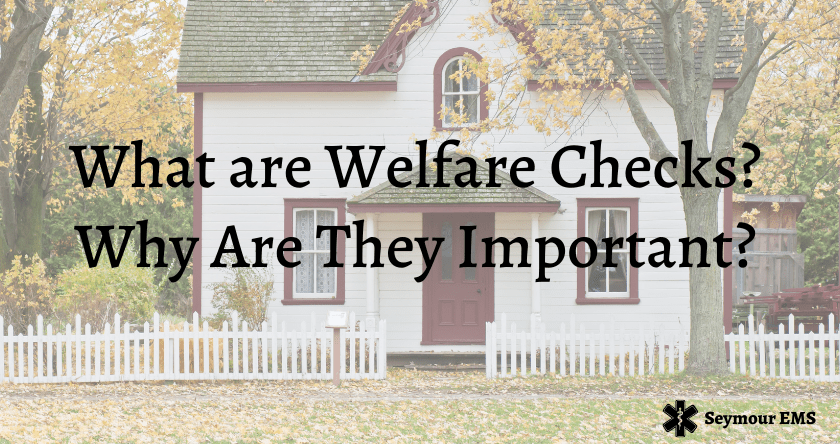Welfare checks make up a large number of calls that EMS providers respond to each year. When it comes to welfare checks, these tips can help ensure the safety of everyone involved. Check out these helpful tips for welfare checks for EMS responders.
What Are Welfare Checks?
Social contacts are an important part of the everyday safety of individuals. Most people rely on their friends, family, and neighbors to check on them regularly. When a loved one fails to respond to a regular check-in, emergency responders may be called in to conduct a welfare check. This essential law enforcement and EMS function is an important tool for building safe communities.
The following are examples of situations that call for checks:
- You normally see your neighbor and know when they will be away for an extended time, but it’s been a long time since you have seen them. You call them or knock on their front door, but don’t get a response.
- Your elderly parent or grandparent calls you once a week, but you haven’t heard from them. When you try to contact them, you don’t get a response.
- Your friend who lives alone has been having suicidal thoughts. He/she sent you a message that causes you concern and you can’t get ahold of them after that.
If you need to call in a check, the first step is to contact your local police department. If you feel like a major emergency situation may be in progress, call 911 directly. Otherwise, you can call your local police department at their non-emergency phone number. You will need to get in touch with the police department local to the residence where your loved one lives.
When police respond to welfare checks where they find the person in good health, they will likely just call you to let you know everything is fine. If the person is sick, injured, or deceased, they will call for emergency assistance immediately. EMS will respond to the scene ASAP and perform the necessary measures to stabilize the patient. If necessary, they will transport them to the emergency room for further assistance. While there are several reasons why welfare checks are conducted, the most common is to check on elderly persons who live alone.
Important Tips for EMS Providers
When it comes to welfare checks, these tips can be of great help if you are an EMS provider.
Put Your Safety First
Since many jurisdictions dispatch multiple agencies, paramedics and EMTs may respond to the scene before police arrive. Remember that provider safety is a top priority. Follow your instincts when it comes to entering welfare checks without the police present. If something feels off, wait for the police to check out the safety of the scene. If you’re not safe, you can’t perform the job you were called to do in the first place. Police are the primary agency called to welfare checks. Do you best to follow the hierarchy of response.
Follow Protocol Carefully
If you feel that the scene is safe and police have yet to respond, there is some protocol that would allow fire and EMS to enter first. Follow common sense when it comes to forcible entry if the police aren’t on the scene. Common sense guidelines would say that you should only force entry ahead of the police if you:
- See something concerning, such as a patient’s body through the window
- Hear something concerning, such as a person calling for help
- Smell something concerning, such as fire or natural gas
Make Sure All-New EMS Professionals Are Trained
All EMS professionals should be trained by their department on how to handle welfare checks. Training should include:
- Providing welfare check protocol
- How to size up the scene
- How to notify a patient that entry is being made
- Assessing a patient properly
- Escaping violent encounters
- Understanding when a forcible entry is allowed without police presence
Make sure your EMS personnel understand the risks associated with welfare checks. Risk assessment and mitigation is an important part of ongoing EMS training.
Find Ways to Deliver Lasting Intervention to Reduce Welfare Checks
While welfare checks are a necessary, essential resource in every community, they often take an intensive response to executing. Many welfare checks result in an unsatisfactory outcome. This includes no patient present, a non-billable transport refusal, or civilian distress when parts of the house need to be destroyed to gain entry. When you notice a patient who calls for multiple or regular welfare checks, you should try to discuss lasting intervention with their family. Talk about social service referrals or community paramedic check-ups to help the situation.
Calling for a welfare check may be the difference between life and death when someone you love faces an emergency. When patients understand how welfare checks work and EMS providers do their best to respond effectively, welfare checks can end with the best outcome.


Recent Comments